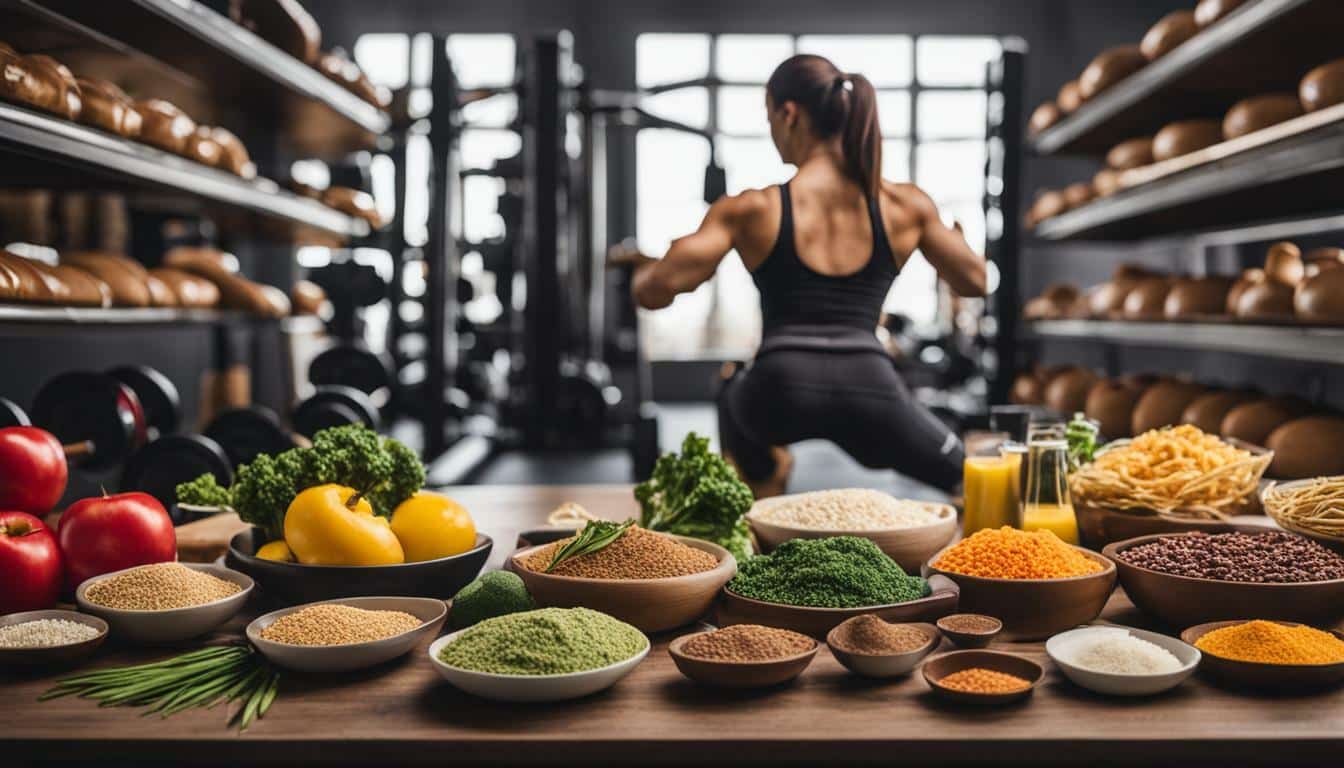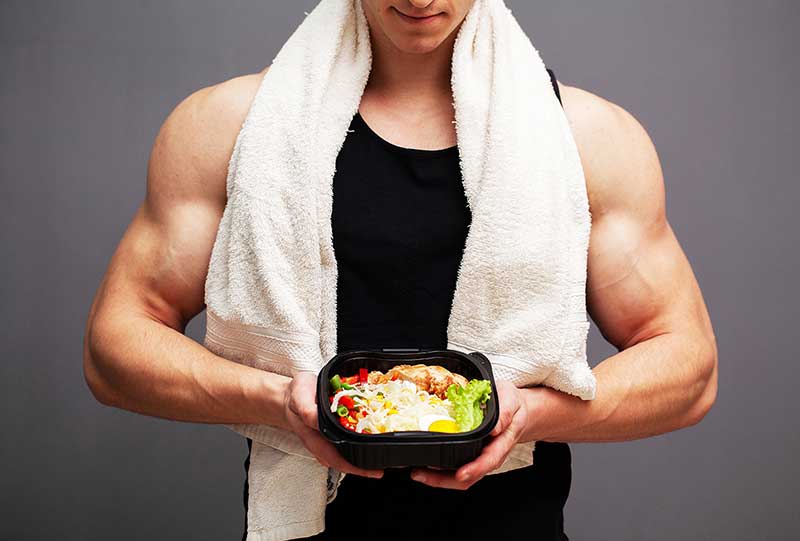Discover How Much Protein You Should Eat to Lose Weight and Build Muscle

The Role of Protein in Weight Loss and Muscle Gain
Protein is an essential nutrient that plays a vital role in maintaining a healthy body. It’s particularly important when it comes to weight loss and muscle gain. When you’re trying to lose weight, protein can help boost your metabolism and reduce your appetite, making it easier to stick to your diet. When you’re trying to build muscle, protein is essential for repairing and building muscle tissue.
Research has shown that protein requirements for weight loss and muscle development are higher than the recommended daily intake of 0.8 grams per kilogram of body weight.
Protein has a high thermic effect, which means that your body uses more energy to metabolize it compared to other nutrients. This can help speed up your metabolism and support weight loss. Additionally, protein has been shown to reduce levels of the hunger hormone ghrelin, which can help you feel fuller for longer periods of time.
When it comes to muscle growth, protein is essential for repairing and building muscle tissue. During exercise, muscles experience microtears and need protein to repair and grow stronger. This is why athletes and bodybuilders often consume more protein than the average person.
The Importance of Protein in Muscle Recovery
Protein is also important for muscle recovery. After a workout, your muscles need protein to repair and rebuild. Without enough protein, your muscles won’t recover as quickly, which can lead to a plateau in your fitness progress.
How to Calculate Your Protein Needs for Weight Loss and Muscle Building
Understanding your personal protein requirements is crucial for achieving your weight loss and muscle building goals. Your protein needs depend on various factors including your body weight, activity level, and fitness goals.
The recommended โปรตีนพืช intake for weight loss is slightly different from that for muscle building. To calculate your protein requirements for each goal, you need to follow the steps below:
Protein Requirements for Weight Loss
- Step 1: Calculate your resting metabolic rate (RMR) using a reliable online calculator or a healthcare professional. This determines the minimum number of calories your body needs to function at rest.
- Step 2: Determine your activity level using the Harris-Benedict equation or another reliable method. This calculates the number of calories you burn during physical activity.
- Step 3: Subtract 500-1000 calories from your daily caloric needs to lose 1-2 pounds per week.
- Step 4: Multiply your desired daily caloric intake by 0.25. This will give you the number of calories you need from protein per day.
- Step 5: Divide the number of protein calories by 4 to get the recommended daily grams of protein.
Protein Requirements for Muscle Building
- Step 1: Calculate your total daily energy expenditure (TDEE). This is the total number of calories your body needs to maintain your current weight.
- Step 2: Determine your activity level using the Harris-Benedict equation or another reliable method. This calculates the number of calories you burn during physical activity.
- Step 3: Add 250-500 calories to your daily caloric needs to gain muscle mass.
- Step 4: Multiply your desired daily caloric intake by 0.4. This will give you the number of calories you need from protein per day.
- Step 5: Divide the number of protein calories by 4 to get the recommended daily grams of protein.
Remember, these formulas are just a starting point. Your protein requirements may vary depending on your individual needs and goals. Consult with a registered dietitian or healthcare professional to determine the best protein intake plan for you.

Protein Intake Guidelines to Achieve Weight Loss and Muscle Building
When it comes to weight loss and muscle building, protein is an essential macronutrient. It helps to build and repair muscle tissue, increase satiety, and boost metabolism. The amount of protein you need will depend on your body weight, activity level, and fitness goals.
Daily Protein Requirements
Most experts recommend consuming between 0.8-1.2 grams of protein per pound of body weight daily for muscle gain and 1-1.5 grams per pound of body weight for weight loss. However, the ideal protein intake will vary based on individual factors, such as age, gender, and physical activity. It is best to consult with a registered dietitian to determine your specific protein needs.
Protein Timing
Protein timing is also an important consideration for achieving weight loss and muscle gain. Consuming protein before and after exercise can optimize muscle building and recovery. Aim to consume a protein-rich snack or shake within 30 minutes of finishing your workout.
Incorporating Protein into Your Diet
There are many tasty and nutritious foods that can help you meet your protein requirements. Some examples include:
- Lean meats, such as chicken, turkey, and fish
- Eggs and egg whites
- Dairy products, such as Greek yogurt and cottage cheese
- Plant-based sources, such as beans, lentils, nuts, and seeds
- Protein supplements, such as whey protein powder
Try to include a protein source with every meal and snack to ensure you are getting enough protein throughout the day.
Protein Intake Guidelines to Support Muscle Development
When it comes to building muscle, protein is a key nutrient that provides the essential building blocks needed for muscle tissue repair and growth. Adequate protein intake is necessary for optimal muscle development and recovery.
The general protein intake guidelines for individuals aiming to build muscle are higher than those for weight loss. It is recommended that individuals consume between 1.2 and 1.7 grams of protein per kilogram of body weight per day to support muscle growth and development.
It is also important to spread protein intake throughout the day, with each meal containing a good source of protein. Consuming protein within 30 minutes of completing a workout can also aid in muscle recovery and development.
Protein timing is also important, as studies have shown that consuming protein before and after a workout can lead to greater muscle protein synthesis. This means that having a protein-rich snack or shake before and after your workout can help maximize muscle growth and recovery.
When selecting protein sources, it is important to choose high-quality, complete proteins that contain all essential amino acids. Examples of such sources include lean meats, poultry, fish, eggs, dairy products, and plant-based protein sources such as soy, quinoa, and beans.
Table: High-Quality Protein Sources to Support Muscle Development
| Protein Source | Protein Content (g) per Serving |
|---|---|
| Chicken Breast | 31g |
| Turkey Breast | 30g |
| Fish (Salmon) | 26g |
| Eggs | 6g (1 large egg) |
| Greek Yogurt | 17g (6 oz) |
| Soybeans | 28g (1 cup) |
While protein is critical for muscle development, it is important to note that it is just one piece of the puzzle. A balanced diet that includes carbohydrates, healthy fats, and a variety of micronutrients is essential for overall health and optimal muscle development.
The Ideal Protein Consumption for Losing Weight and Building Muscle
Many fitness enthusiasts are looking to lose weight while building muscle. Achieving both goals simultaneously requires a balanced approach with regard to protein intake. The ideal protein consumption is determined by a number of factors, including body weight, activity level, and fitness goals. For weight loss, it is recommended to consume 1.2-1.6 grams of protein per kilogram of body weight. For muscle gain, on the other hand, a higher protein intake of 1.6-2.2 grams per kilogram of body weight is recommended.
It is important to note that consuming too much protein can be counterproductive, as excess protein cannot be stored in the body and will be excreted through urine. In addition, consuming excessive protein can lead to dehydration and strain on the kidneys.
Timing is also crucial when it comes to protein intake. Consuming protein shortly after a workout can aid in muscle recovery and growth. For optimal results, it is recommended to consume protein within 30 minutes of completing a workout.
While protein is essential for weight loss and muscle gain, it is important to maintain a balanced diet and incorporate other essential nutrients into your meals.
The Ideal Protein Consumption for Losing Weight and Building Muscle
When it comes to losing weight and building muscle, protein is a key nutrient. However, determining how much protein you should eat can be challenging. The ideal protein consumption for losing weight and building muscle depends on several factors, including your weight, body composition, activity level, and fitness goals.
How much protein should you eat to lose weight?
If your goal is to lose weight, then protein can help support your efforts. Studies have shown that protein can boost your metabolism, reduce your appetite, and help you burn more calories. The recommended protein intake for weight loss is typically around 1.2-1.6 grams per kilogram of body weight. So, if you weigh 68 kg (150 lbs), then you should aim to consume between 82-109 grams of protein per day.
How much protein should you eat to build muscle?
If your goal is to build muscle, then protein is essential for repairing and building muscle tissue. The recommended protein intake for muscle building is typically higher than for weight loss, around 1.6-2.2 grams per kilogram of body weight. So, if you weigh 68 kg (150 lbs), then you should aim to consume between 109-150 grams of protein per day.
How to balance protein intake for losing weight and building muscle
If you’re looking to simultaneously lose weight and build muscle, then it’s important to balance your protein intake. This means consuming enough protein to support muscle growth and recovery, while also maintaining a calorie deficit to support weight loss. The ideal protein consumption for losing weight and building muscle is typically around 1.6-2.0 grams per kilogram of body weight. So, if you weigh 68 kg (150 lbs), then you should aim to consume between 109-136 grams of protein per day.
Remember, protein should be consumed in combination with a balanced diet and regular exercise to achieve optimal results. By following these protein intake guidelines, you can optimize your weight loss and muscle-building goals.
FAQ
What is the role of protein in weight loss and muscle gain?
Protein plays a crucial role in weight loss by boosting metabolism and reducing appetite. It also supports muscle building and recovery by repairing and building muscle tissue.
How do I calculate my protein needs for weight loss and muscle building?
To calculate your protein needs, you can use formulas and examples based on your body weight, activity level, and fitness goals. This will help determine the right amount of protein for you.
What are the protein intake guidelines to achieve weight loss?
To support weight loss, it is recommended to incorporate a certain amount of grams of protein per day into your diet. We will provide suggestions on how to include protein-rich foods in your meals.
What are the protein intake guidelines to support muscle development?
For those aiming to build muscle, we will discuss the recommended protein consumption to support muscle growth and recovery. We will also provide strategies for optimizing protein timing.
How much protein should I consume to lose weight and build muscle?
To achieve both weight loss and muscle gain, it is important to find the ideal protein consumption. This section will provide insights into balancing your protein intake for optimal results.
What is the conclusion regarding protein consumption for weight loss and muscle building?
By understanding the role of protein, calculating your personal protein needs, and following the recommended guidelines, you can optimize your fitness journey and achieve your desired goals.